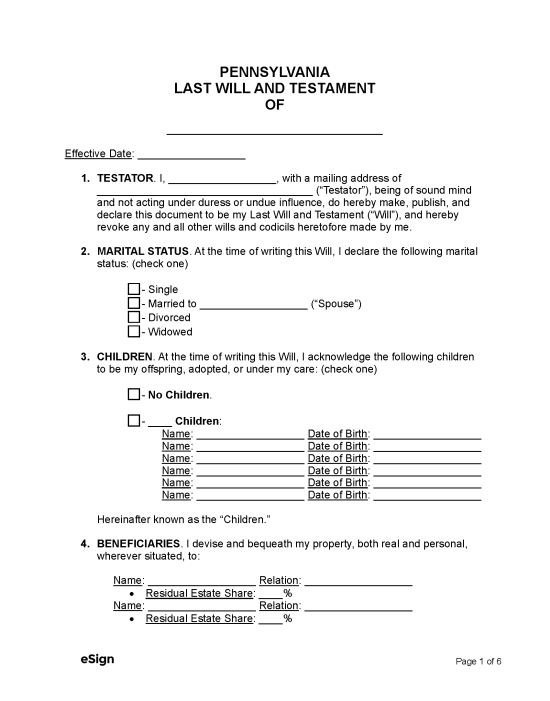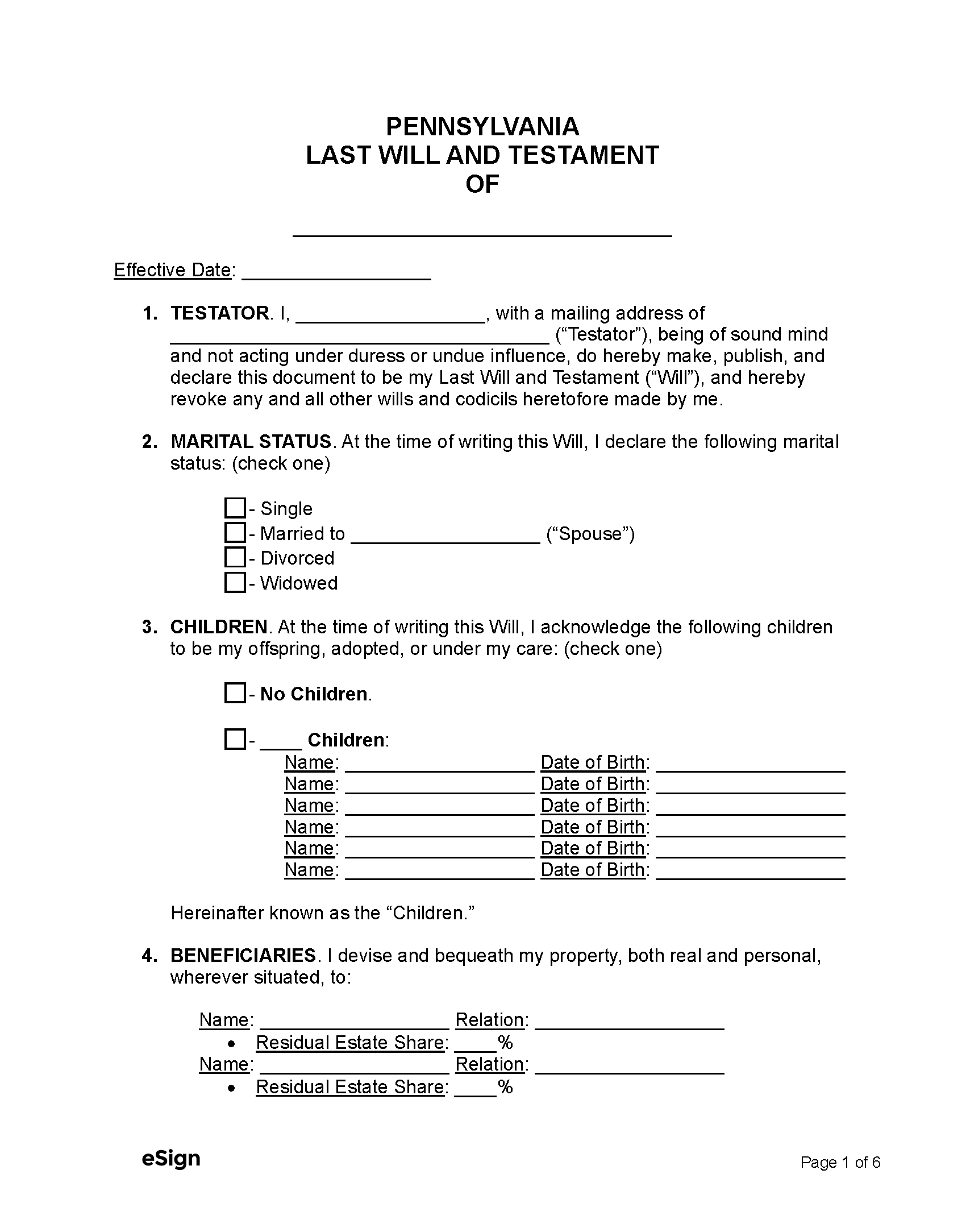State Laws
Any person who is sound of mind and at least 18 years old can make a will.[1]
Holographic Wills – Handwritten wills are considered valid in Pennsylvania only if they meet the same signing requirements as typed wills.
Revocation – A will can only be revoked by destroying the original, creating a new will, or drafting a statement that explicitly nullifies the document.[2] In the event of a divorce, any parts of the will regarding the former spouse lose their effect.[3]
Signing Requirements – A will must include the testator’s signature. If the testator cannot physically sign or can only write their mark, two witnesses must also sign the will while in the testator’s presence.[4]
Probate Process in Pennsylvania (9 Steps)
A person who passes away with a legally valid will is considered to have died testate, and their estate is subject to the probate process. Part of this legal procedure involves the appointment of an executor to manage the estate’s assets and distribute them to beneficiaries.
- Gather Probate Documents
- Submit Paperwork
- Advertise Probate
- File an Inventory
- Provide Notice to Interested Parties
- Submit Tax Returns
- Settle Debts
- Make Final Accounting
- Settle the Estate
1. Gather Probate Documents
Pennsylvania offers a simplified probate process that can be applied for with a Small Estate Affidavit, or “Petition for Settlement of a Small Estate,” but only if the estate is valued at $50,000 or less (not counting real estate and certain personal property).[5][6]
The probate process will be initiated by the executor appointed in the decedent’s will. To begin, the executor must prepare a filing package that consists of the following:
- Original Will
- Death Certificate
- Estate Information Sheet (REV-346)
- Petition for Probate and Grant of Letters Testamentary (Form RW-02) – Includes an Oath of Personal Representative
- Photo ID
- Documentation proving the value of the decedent’s real estate (if applicable)
- Filing fee – Costs vary depending on the county and estate size
2. Submit Paperwork
The executor’s filing package must be submitted to the register of wills in the county where the decedent lived before their death.[7] Upon approval of the filing package, the executor will receive a document called Letters Testamentary, which validates their appointment to manage the decedent’s estate. Additionally, the executor will be given the following:
- Notice of Estate Administration (Form RW-07)
- Certification of Notice (Form RW-08)
- Status Report (Form RW-10)
- Inventory (Form RW-09)
- Request for Short Certificate Form (SAMPLE – Lehigh County) – Used to request a Short Certificate, a document that may be needed to take possession of certain estate assets
- Copy of the Oath of Personal Representative
- Copy of the Will
Probate Bond
The register of wills might require the executor to post a probate bond before allowing them to manage the estate.[8] If a bond is filed with the register of wills, it will only be returned to the executor once they successfully complete their estate administration duties.
3. Advertise Probate
Directly after receiving Letters Testamentary, the executor must advertise the probate proceeding to the decedent’s creditors. This is done by publishing a notice once a week for three straight weeks in a newspaper distributed in the area where the decedent lived and in a legal periodical approved by the court.[9]
Creditors must present their claims within one year of the advertisement’s publication.[10]
4. File an Inventory
Using the Inventory provided by the register of wills, the executor must list and appraise all the decedent’s real estate and personal property.[11] The completed Inventory and two photocopies must be filed no later than the date the executor submits their Final Accounting or within nine months after the decedent’s death, whichever comes first.
5. Provide Notice to Interested Parties
A probate notice must be given to those with a beneficial interest in the estate, such as the decedent’s heirs and beneficiaries.[12] To accomplish this, the executor must do the following:
- Fill out the Notice of Estate Administration provided by the register of wills.
- Serve a copy of the Notice of Estate Administration to the interested parties within three months after receiving Letters Testamentary.
- Notice may be served by personal delivery or first-class mail.
- File a Certification of Notice (Form RW-08) with the register of wills within ten days after service.
6. Submit Tax Returns
One of the executor’s administrative duties is to file and pay the applicable federal and state tax returns listed below.
- Inheritance Tax – A Pennsylvania inheritance tax return must be filed with the Department of Revenue within nine months after the date of death.[13]
- Estate Tax – Depending on the estate’s value, a federal estate tax return may need to be filed within nine months after the decedent’s death.
- Estate Income Tax – A Pennsylvania fiduciary tax return and federal estate income tax return are required if the estate earned income during the current tax year.
- Personal Income Tax – The decedent’s personal income tax return must be filed with the Pennsylvania Department of Revenue and the IRS no later than April 15 of the year after their death.
7. Settle Debts
Any debts owed to the decedent’s creditors will need to be paid before the estate can be settled. If the decedent didn’t leave enough assets to cover each debt, the executor must prioritize their payments in the following order:[14]
- Administration costs
- Family exemption[15]
- Funeral/burial expenses and medical care received in the final six months
- Cost of grave marker
- Rent owed during the six months before the decedent’s death
- Claims by the state and political subdivisions
- All other claims
8. Make Final Accounting
After all debts and taxes have been paid, the executor can prepare an Accounting of the estate assets and expenses (see sample). Once completed, the Accounting must be approved by either the beneficiaries or the register of wills.
- Approval of Accounting by Beneficiaries – If the beneficiaries agree to the executor’s Accounting, they must sign a Receipt and Release to confirm their consent (no official form available).
- Approval of Accounting by Register of Wills – Without the beneficiaries’ approval, the executor must provide the register of wills with the Accounting and a Petition for Distribution (SAMPLE – Allegheny County). A hearing will be scheduled, and a hearing notice will be provided to the beneficiaries. After the hearing, a judge will make a ruling on the subject.
9. Settle the Estate
Once the Accounting is approved by the beneficiaries or the register of wills, the executor can proceed with distributing the remaining assets. After distribution, the estate settlement can be finalized by submitting the Status Report, which was provided when initiating the probate process. If applicable, the Receipt and Release forms should be filed as well.
Note: A Status Report must be filed no later than two years after the decedent’s death and each year afterward until the estate is settled.[16]

